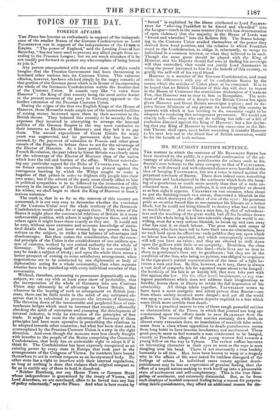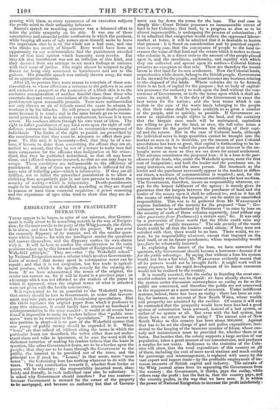MR. BEAUMONT SMITH'S SENTENCE.
THE manner in which the sentence of Mr. BEAUMONT Smrrn has been received by the public, is a powerful confirmation of the ad- vantage of abolishing death punishments for crimes such as his. Salmi's case belongs to the same category as that of FAUNTLEROY. All the well-dressed and well-educated classes were horrified at the idea of hanging FAUNTLEROY, but not a voice is raised against the perpetual servitude of SMITH. There does indeed seem something capricious and lackadaisical in the sentiment which feels the hang- ing of a gentleman so much more acutely than that of a rude un- educated man. At bottom, perhaps, it is not altogether so absurd as at first sight it appears. CHANTER,/ on one occasion, when about to put the finishing-touch to a statue, discovered a blemisle in the marble which destroyed the effect of one of the eyes : his generous pride as an artist forced him to recommence his labours on a better block, but he could not bring himself to destroy what had cost him so much labour. And so when a man has, by dint of schoolmas- ters and the teaching of the great world, had all his faculties drawn out and his whole being licked into tolerable shape, the world is un- willing, even for a very serious blemish, to break up and cast away what has cost it so much labour. The poor waifs and strays of humanity, who have been left to form their own no-characters, have no such hold upon its affections: rude pebbles they are, upon which no labour has been expended, and which consequently economists will tell you have no value ; and they are allowed to drift down upon the gallows with little or no sympathy. Doubtless, the class to which they belong think this hard—their lives are as dear to them as gentlemen's lives are to gentlemen ; but they are in the condition of the lion, who being no painter, was obliged to acquiesce in the sign-post's partial representation of the issue of a fight be- tween a man and lion. Be this, however, as it may, there is always a vast deal of sympathy felt for a genteel rogue about to be hanged the hardship of his fate is so keenly felt, that men take part with him against the law. On the other hand, banishment, or any ana- logous punishment which does not address their imaginations so forcibly, leaves them at liberty to retain the full impression of his criminality. All things taken together, FAUNTLEROY seems to have been a more energetic and adroit person than SMITH—one from whom society incurred more danger; and yet all the world was agog to save him, while SMITH departs unpitied to a fate which some think more terrible than death.
This is a practical answer to one of those rough powerful articles so characteristic of the Times, in which that journal not long ago commented upon the efforts made to save BLAILESLEY from the gallows. The execution of that convict certainly drew forth, as almost every execution does, an inundation of mawkish false senti- ment from a class whose opposition to death-punishments seems from long habit to have become involuntary and mechanical. These good people seem to feel towards a man condemned to be banged, exactly as Peachum alleges all the young women feel towards a young fellow on the way to Tyburn. The veriest ruffian becomes an interesting character in their eyes as soon as the rope is seen dangling over his head. There is not necessarily a true healthy humanity in all this. Men have been known to weep at a tragedy who in the affairs of life were noted for ruthless disregard of the feelings of others. In individual cases outcry against death- punishment may be less an expression of genuine feeling, than the effort of a torpid nature seeking to work itself up into a pleasurable state of excitement and self-complacency. This is the true false- gallop of sentiment, and extremely distasteful. But, so far from such displays of morbid unsound feeling being a reason for perpetu- ating death-punishments, they afford an additional reason for clis
pensing with them, as every recurrence of an execution subjects the public mind to their unhealthy influence. Siant's speech on receiving sentence was a laboured effort to inlist the public sympathy on his side. It was one of those ostentatious and uncandid public confessions in which the penitent, while heaping all sorts of ugly names upon himself, seeks to leave the impression that he is on the whole not a bad man, and one who thinks too meanly of himself. Here would have been an -opportunity for our sentimentalists had the punishment awarded been of that kind against which humanity most revolts. But they felt that banishment was not an infliction of this kind, and they desisted from any attempt to set men's feelings at variance with their sense of justice. One might almost be tempted to pity SA= for being only sentenced to banishment and not to the gallows. His plausible speech was entirely thrown away, for want of an appropriate situation.
After all, no persons have more reason to complain of these sen- timentalists, to whose affections a sentence to the gallows is as sure and exclusive a passport as the possession of a black skin is to the exclusive commiseration of another fanciful class, than those who entertain deep and rooted convictions of the inexpediency of death punishments upon reasonable grounds. Your mere sentimentalist not only throws an air of ridicule round the cause he adopts, he weakens it by his fallacies. lie will protest against death-punish- ment because it is cruel ; and in the same breath go on to recom- mend perpetual, it may be solitary confinement, because it is more severe. He confuses others through his own want of ideas. The right to inflict punishment of any kind rests upon the right of self- .defence, common to individuals and to communities composed of individuals. The limits of the right to punish are prescribed by the consideration that they must be adequate to effect their pur- pose. To this end, it is necessary—first, that they be of a na- ture, if known, to deter from committing the offence they are at- tached to ; second, that they be not of a nature to make men feel more compassion for the offender than indignation at his crime ; third, that they be published beforehand, so that all may know them, and inflicted whenever incurred, so that no one may hope to escape. These conditions are indispensable to the efficiency of punishment. If any of them are wanting, pain is inflicted for the mere sake of inflicting pain—which is inhumanity. If they are all fulfilled, not to inflict the prescribed punishment is to allow a shrinking from sympathetic pain in our own persons to weaken the security of society—which is inhumanity. Death-punishments ought to be maintained or abolished according as they are found to possess or want these essential requisites : a priori reasoning and the experience of ages alike tend to show that they are de- ficient.



























 Previous page
Previous page